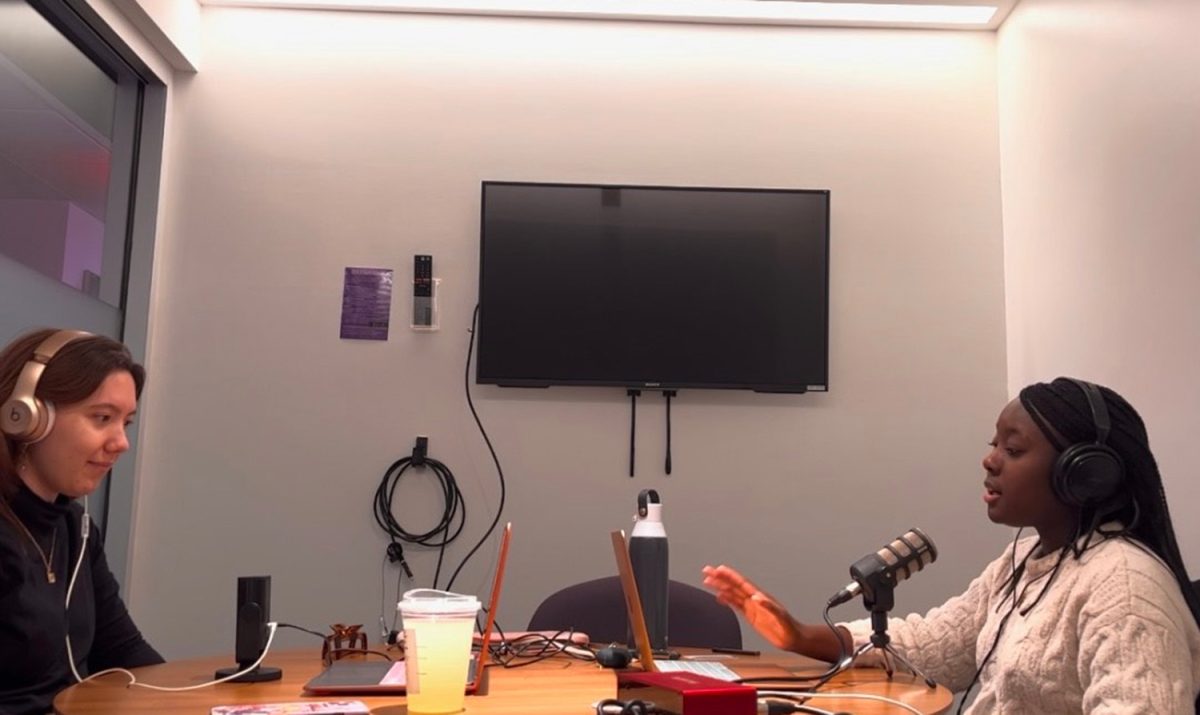Madeline Gregorski and Layla Palmer’s “Snuffed: An Untrue Crime Podcast” recently won in the fiction category of Mackie and Emerson College’s Podcast Pitch Contest.
The contest, offered to currently enrolled Emerson undergraduate students, provided a Podcast Studio by Mackie, an audio equipment and studio gear brand. A panel of industry judges selected the winners based on the criteria of a title, a one-sentence description, and a 60-second pitch needed to enter the contest.
Snuffed is a fictional true-crime podcast structured in the format of a Q&A. Gregorski asks questions about a fictional case while Palmer answers. The podcast aims to entertain, educate, and eliminate the exploitations that come with true crime podcasts, according to Palmer. It will be available on all major streaming platforms. A release date has not been set yet.
Palmer, a junior business of creative enterprises major, had previous experience with podcasting, having hosted her own show called Hollywood Hero. Gregorski, a junior creative writing major, had a long-time interest in true crime. Both came up with the idea for a true crime podcast during their freshman year.
“Madeline loves true crime, and I just love producing podcasts, so that came together,” Palmer said of their podcast’s creation. “We spent hours in my dorm just trying to flush out the first episode from beginning to end, and then we just started rolling with it, kept writing, and kept creating.”
Producing an episode usually starts with a very basic idea that develops into a list of characters and their backgrounds. While Gregorski and Palmer came up with ideas together, Gregorski primarily wrote the script.
“That story starts to develop and you get new details and throw different things in, but the story sometimes takes itself places you don’t want it to and or you didn’t originally plan for it to,” Gregorski said. “It kind of is very much like a progression of thought.”

After establishing the stories foundation, Gregorski conducts in-depth research on the legal aspect and the feasibility to ensure that their story, though fiction, is as realistic as possible.
“You always have to keep going and digging deeper until you’re able to find what is necessary and also what is actually correct because I don’t ever wanna spread any sort of misinformation,” said Gregorski.
Gregorski’s research also includes being mindful of sensitive subjects. Palmer and Gregorski make it a point not to touch on sexual assault or children, steer clear of prejudices and biases, and include resources for listeners who may be struggling with topics mentioned in the podcast.
“We’re trying to stop the monetization of people, talking about sexual assault, crimes and the way they speak about these victims,” Gregorski said. “We want to still handle it with the respect a real person would deserve.”
Gregorski and Palmer want to educate their audience about sensitive subjects and topics that are often sensationalized in the podcast world.
“It is not about making a difference on a huge scale; it is just about anything that you can do to draw attention to an issue that you in your heart feel needs change,” Palmer said.
Once the episode is written, Palmer and Gregorski convene to correct grammar and spelling errors. The recorded episodes are around 40 to 45 minutes long, which falls on the shorter side of podcasts. The pair said they aim to keep the episodes around this length to remain consistent in their series.
“One thing that I have learned when it comes to podcasting is that listeners really like the consistency, so if you start releasing episodes and your first episode is 30 minutes long, and your second episode is 2 hours, that’s jarring for the listener,” Palmer said.
Gregorski and Palmer were awarded a Mackie Podcast Studio, which includes a DLZ Adaptive Digital Mixer, two EM-99B Broadcast Dynamic microphones, two MC-350 professional headphones, two DB-200 Boom Arms, and a one-year subscription to an editing software.
“Being a college student … we can’t really afford that kind of equipment. It’s just not feasible. We have other expenses that are more important,” Gregorski said. “So as a college student, it’s really nice to have better equipment to be able to produce better at our age, which is usually not possible.”
Both Palmer and Gregorski are honored to be recognized for a project so close to their heart.
“Having an emotional connection to something that you are working on, no matter how far along in the process that you are, it is going to make a difference, and it is going to help you get recognized,” Palmer said.